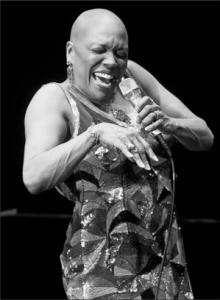
DAVE BAZEMORE PHOTOS
“Are there any children in the audience?” asked Dee Dee Bridgewater at the Lobero on Friday night. There weren’t. “I don’t want them to think this is what jazz singers look like.”
Ms. Bridgewater’s joke — after a very naughty and bawdy series of double entendres — spoke a truth about the entire evening. Ms. Bridgewater doesn’t fit many people’s safe or generic idea of a “jazz singer” either. At 59, she’s a singular force, roiling with life.

The evening explored the Billie Holiday songs that make up her just-released tribute album, “Eleanora Fagan To Billie With Love From Dee Dee Bridgewater.” Years ago she played Ms. Holiday in a European production of “Lady Day,” and she’s also produced three other tribute albums — celebrating Kurt Weill, Ella Fitzgerald and Horace Silver.
Ms. Bridgewater’s multi-octave voice is miles, whole continents away from Ms. Holiday’s, so the evening was no sound-alike memorial. (Though she aptly demonstrated her own Holiday impression). Only in the opening verse of “You’ve Changed” did Ms. Bridgewater hint at Ms. Holiday’s phrasing, before moving back into her own style.
No stuffy theater piece, this evening. Backed by her pianist and arranger Edsel Gomez, upright bass player Ira Coleman, drummer Gregory Hutchinson, and sax/flautist Craig Handy, Ms. Bridgewater worked within the quartet of musicians, not just as a star with backing. And the four gave as good as they could muster, urged on by their singer, and dared to match her in improv and scat-singing. When Mr. Handy disappeared into the stratosphere with the highest reaches of his tenor sax, Ms. Bridgewater re-entered the atmosphere with a descending squeal that fooled the ear.
Ms. Bridgewater’s range continued to amaze during the entire 12-song evening. She never returned to a style or method — the Betty Boop-isms of “My Mother’s Son-in-Law,” the method acting of “Don’t Explain” that ended with her whispering in resigned defeat, the barrelhouse growl at the center of “Fine and Mellow.”
And then there was the personality. Ms. Bridgewater spins yarns, goes off on tangents, flirts with the audience, and seems intent on making her band blush. She managed to so flummox Mr. Hutchinson that he stopped drumming to fall off his stool in laughter. (What she said to him wasn’t miked, so our own imagination can provide a dirtier reason.)
After “You’ve Changed” she acted so sexed up she couldn’t concentrate, mentioning her youthful mashing days, when you’d replace all the lights in the basement with red bulbs. “That’s how we did it in the Midwest,” she laughed. The audience — who may or may not have basements or the bulbs to go ’round — laughed along with her.
This unstoppable rawness is all Ms. Bridgewater, but, as she pointed out, also the side of Billie Holiday she wanted audiences to appreciate. Ms. Holiday had her major demons and left life too early, but, Ms. Bridgewater said, she was funny and could curse like a sailor. She’d also cook for the band. You could almost imagine it — Holiday joking around, leaning back on her pianist, red fan in hand, hot and bothered, matching her musicians note-for-note — because it was there on stage Friday night.
Mr. Handy and Mr. Hutchinson were the musical stars of the show. Mr. Handy (“My Handyman” Ms. Bridgewater calls him) dropped some Coltrane phrases in the opening, but after that it was his own sound, on fire, exploring the full dynamics of the instrument, dropping down into the tenor’s lowest register like a stone thrown in a pond. On flute he was equally as good, more ethereal. Mr. Hutchinson’s drumming was energetic and colorful, getting an enormity of sounds out of a basic kit, and nothing else.
Ira Coleman and Edsel Gomez preferred to stay in the background, anchoring the songs, sounding effortless.
Ms. Bridgewater encored with a speedy “All of Me” and closed the show with a solo-heavy “Miss Brown to You,” but the real closer was her stunning “Strange Fruit.” No Holiday tribute could be complete without Abel Meeropol’s (aka Lewis Allan’s) devastating poem about lynching. After an evening of vocal gymnastics, Ms. Bridgewater kept it straight and unadorned, and the audience hung on every word. It was a balance between knowing what was coming and the suspense of what, if anything, the singer would do with those words. The brief notes from Mr. Handy on his sax were almost too much, needless. And the final line — “a strange and bitter crop” — was inevitable yet surprising at the same time. For a second a window opened, and we could have been back in that New York club in 1939 when Ms. Holiday performed it to stunned silence.Or it could have been on a balmy night in 2010, the evening of a day when, on the East Coast, African-American members of Congress were spat on and racially insulted by protestors.